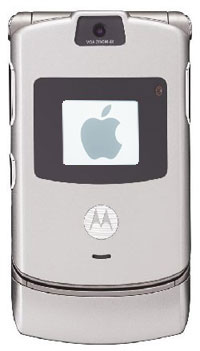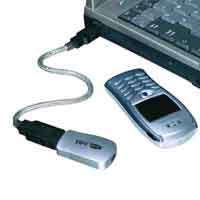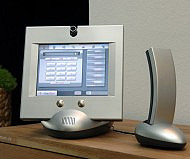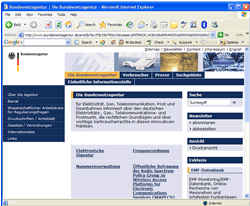 Prototype cellphones capable of transmitting data faster than a startled squirrel on speed have been demonstrated by NTT DoCoMo in Japan, according to the New Scientist.
Prototype cellphones capable of transmitting data faster than a startled squirrel on speed have been demonstrated by NTT DoCoMo in Japan, according to the New Scientist.
To test the speed and reliability of the new phones, the prototype handsets were used to view 32 high definition video streams from a car rolling along at 20 kilometres per hour.
NTT DoCoMo officials claimed that the 4G phones manage to receive data at the incredible rate of 100 megabits per second while on the move, and an astonishing gigabit per second while static.
At these kind of white-knuckle speeds, the contents of an entire DVD could be downloaded within a minute.
Compare those breakneck speeds with the stately download speed of 384 kilobits per second (129 kilobits per second upload) offered by DoCoMo’s current 3G (third generation) phone network.
Naturally, the boffins behind NTT DoCoMo’s experiment high-speed phone network have come up with a suitably techie description of the technology, describing it as Variable-Spreading-Factor Spread Orthogonal Frequency Division Multiplexing (VSF-Spread OFDM).
This _apparently_ increases downlink speeds by using multiple radio frequencies to send the same data stream.
 During the tests, another smartypants wireless networking trick was employed to send data via various routes across a network to further increase data capacity.
During the tests, another smartypants wireless networking trick was employed to send data via various routes across a network to further increase data capacity.
Going under the snappy acronym of MIMO (multiple-input-multiple-output) multiplexing, the technology could, for example, enable a cellphone to receive data from more than one base station in range.
Lajos Hanzo, a communications expert at Southampton University in the UK found the prototypes “technically impressive,” but warned that NTT DoCoMo will need assistance from other phone companies for 4G take-up.
“In today’s world nobody can go it alone,” he told the New Scientist.
“And hence any standard proposal must be internationally ratified, which has not as yet take place,” he added.
There’s already been some international activity to cooperate on standards, with Japan and China signing a memorandum on 24 August to work together on 4G.
But don’t start throwing out your 3G phones quite yet though: NTT DoCoMo doesn’t expect to launch a commercial 4G network until 2010.
 Pop stars are falling over themselves to fill their pockets with corporate cash as the Apple/Motorola iTunes phone promotion machine switches into overdrive.
Pop stars are falling over themselves to fill their pockets with corporate cash as the Apple/Motorola iTunes phone promotion machine switches into overdrive. The Brand Republic article goes on to say that, “The ads may debut from next week, at the same time the Motorola phone with iPod personal music system is launched.”
The Brand Republic article goes on to say that, “The ads may debut from next week, at the same time the Motorola phone with iPod personal music system is launched.” For the first time since its UK launch May 2004, the online music store Napster has dished the dirt on its usage and membership figures for the UK.
For the first time since its UK launch May 2004, the online music store Napster has dished the dirt on its usage and membership figures for the UK. This represents an amazing turnaround for Napster who famously started life as the brainchild of an 18-year-old college dropout named Shawn Fanning in 1999.
This represents an amazing turnaround for Napster who famously started life as the brainchild of an 18-year-old college dropout named Shawn Fanning in 1999. Napster folded in September 2002, but the brand was revived as a legal P2P service by the owners of the Napster name Roxio in 2003, quickly growing to become a major competitor for market leader iTunes.
Napster folded in September 2002, but the brand was revived as a legal P2P service by the owners of the Napster name Roxio in 2003, quickly growing to become a major competitor for market leader iTunes. After having made the UK wait nearly 9 months since the launch of the
After having made the UK wait nearly 9 months since the launch of the  Those UK’ers who couldn’t wait for the much-desired, multi-media device to arrive had an avenue closed to them after Sony successfully took legal action against grey-importers of Japanese and US equipment.
Those UK’ers who couldn’t wait for the much-desired, multi-media device to arrive had an avenue closed to them after Sony successfully took legal action against grey-importers of Japanese and US equipment. The boffins at the US National Science Foundation (NSF) have proposed “re-engineering” the Internet to create a whizz-bang updated version that connects all kinds of devices with built in security and robustness.
The boffins at the US National Science Foundation (NSF) have proposed “re-engineering” the Internet to create a whizz-bang updated version that connects all kinds of devices with built in security and robustness. The goals of the GENI Initiative include a new core functionality for the Internet, with new naming, addressing, and identity architectures; enhanced capabilities, including additional security architecture and a design for high availability; and new Internet services and applications.
The goals of the GENI Initiative include a new core functionality for the Internet, with new naming, addressing, and identity architectures; enhanced capabilities, including additional security architecture and a design for high availability; and new Internet services and applications. UK Online have officially joined the 24Mbps broadband party by announcing the October launch of their own broadband ADSL2+ based product.
UK Online have officially joined the 24Mbps broadband party by announcing the October launch of their own broadband ADSL2+ based product. UK Online has been conducting technical trials of its ADSL2+ service since March of this year and their 24Mb broadband service should be available in October for under £30 (~$55 ~€43) a month.
UK Online has been conducting technical trials of its ADSL2+ service since March of this year and their 24Mb broadband service should be available in October for under £30 (~$55 ~€43) a month. Be Unlimited
Be Unlimited Temptingly, there’s no connection fee for new users with a free Wi-Fi-enabled modem lobbed in for no charge (the company will be using DSLAMs from Alcatel, and a Thompson 716g V5 wireless modem, optimised for VoIP and video-streaming applications.)
Temptingly, there’s no connection fee for new users with a free Wi-Fi-enabled modem lobbed in for no charge (the company will be using DSLAMs from Alcatel, and a Thompson 716g V5 wireless modem, optimised for VoIP and video-streaming applications.) Send Your Name To Pluto
Send Your Name To Pluto It’s fast, but why? Nice solution, but where’s the problem?
It’s fast, but why? Nice solution, but where’s the problem? That’s… Fast!
That’s… Fast! Big Brother is Everywhere
Big Brother is Everywhere Deutsche Telekom have just announced that they will be rolling out 50 Mbit/s connection in 50 cities around Germany by 2007.
Deutsche Telekom have just announced that they will be rolling out 50 Mbit/s connection in 50 cities around Germany by 2007. The “we’ll make the country globally competitive by installing high speed Internet access, but it needs to be made worth our while” argument has been used before by other incumbent telcos when they are trying to get good, or better deals from the regulators.
The “we’ll make the country globally competitive by installing high speed Internet access, but it needs to be made worth our while” argument has been used before by other incumbent telcos when they are trying to get good, or better deals from the regulators. As with all companies at IFA, Grundig have shown a ton of new products, try to persuade the assembled throngs that they are approaching Digital Lifestyles by understanding the consumer.
As with all companies at IFA, Grundig have shown a ton of new products, try to persuade the assembled throngs that they are approaching Digital Lifestyles by understanding the consumer.